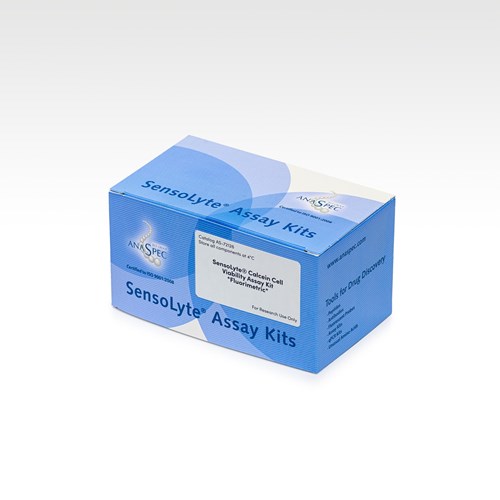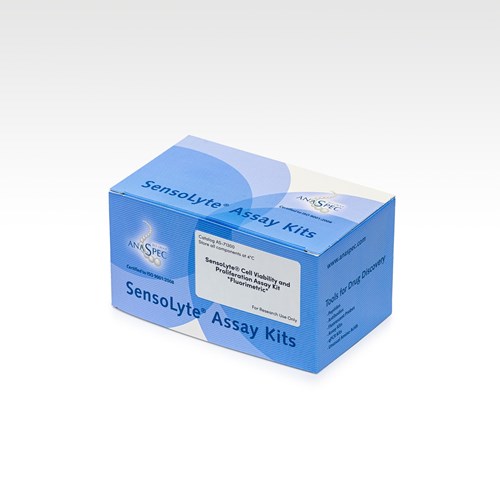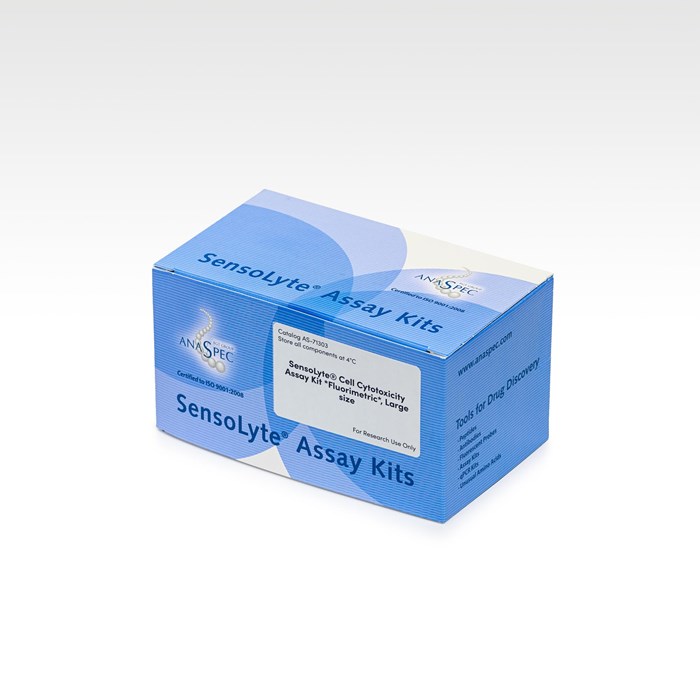SensoLyte® Cell Cytotoxicity Assay Kit Fluorimetric, Large size - 1 kit
- Cat.Number : AS-71303
- Manufacturer Ref. :
-
Availability :
In production
- Shipping conditions : Ice delivery fees must be applied
Alternative choices
The damage of cell membrane leads to the release of cytoplasmic enzymes. The measurement of released cytoplasmic lactate dehydrogenase (LDH) is a well-accepted assay to estimate cell membrane integrity and quantify cytotoxicity. The SensoLyte® Cell Cytotoxicity Assay Kit uses resazurin as a sensitive fluorogenic indicator (Ex/Em=560 nm/590 nm upon conversion) to measure LDH activity. The assay can be performed in a mixed population of damaged and viable cells, but it only measures the LDH released from damaged cells. The cytoplasmic LDH in living cells produces little signals under assay condition. There is no need for extra steps to separate living cells and supernatant. The fluorescent signal is proportional to the number of damaged cells (up to 2.5X104 cell, r2>0.95) with the detection limit reaching 100 dead cells. The kit is suitable for high throughput screening of cytotoxicity of a variety of compounds. 384-well or 1536-well format can be used with minor modifications.
Specifications
| Packaging | |
| Kits components |
|
|---|---|
| Properties | |
| Absorbance (nm) |
|
| Emission (nm) |
|
| Storage & stability | |
| Storage Conditions |
|
| Activity | |
| Application | |
| Detection Method | |
| Detection Limit |
|
| Research Area | |
| Sub-category Research Area | |
| Usage |
|
| Codes | |
| Code Nacres |
|
Downloads
You may also be interested in the following product(s)

SensoLyte® Calcein Cell Viability Assay Kit Fluorimetric - 1 kit

SensoLyte® Cell Viability and Proliferation Assay Kit Fluorimetric - 1 kit
Citations
An experimental study of rabbit conjunctival epithelial toxicity using co-treatment with Mitomycin-C and a histone deacetylase inhibitor
Arch Pharmacal Res . 2010 Aug 28 ; 33 1261 | DOI : https://doi.org/10.1007/s12272-010-0817-x
- T.H. Kim
- et al
Diminished survival of human cytotrophoblast cells exposed to hypoxia/reoxygenation injury and associated reduction of heparin-binding epidermal growth factor-like growth factor
AJOG . 2008 Apr 01 ; 198(4) 471. e1 | DOI : https://doi.org/10.1016/j.ajog.2008.01.009
- R.E. Leach
- et al
Epidermal Growth Factor-Like Growth Factors Prevent Apoptosis of Alcohol-Exposed Human Placental Cytotrophoblast Cells
Biol Reprod . 2007 Aug 23 ; 77(1) 53 | DOI : 10.1095/biolreprod.106.057984
- G.S. Wolff
- et al
Human trophoblast survival at low oxygen concentrations requires metalloproteinase-mediated shedding of heparin-binding EGF-like growth factor.
Development. . 2006 Jan 11 ; 133(4) 751 | DOI : 10.1242/dev.02237
- D.R. Armant
- et al
In vitro cytotoxicity screening of water-dispersible metal oxide nanoparticles in human cell lines
Bioprocess Biosyst Eng. . 2009 Jul 28 ; 33(1) 21 | DOI : 10.1007/s00449-009-0354-5
- J. Choi
- et al
